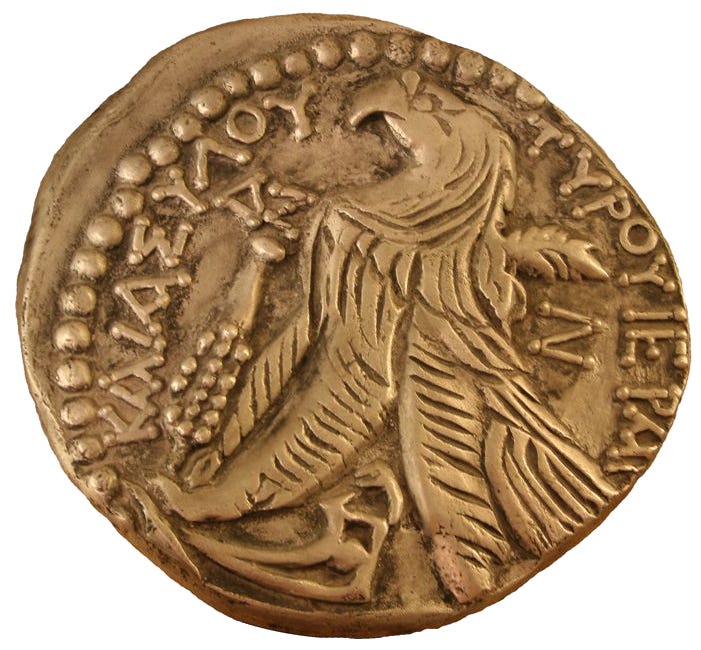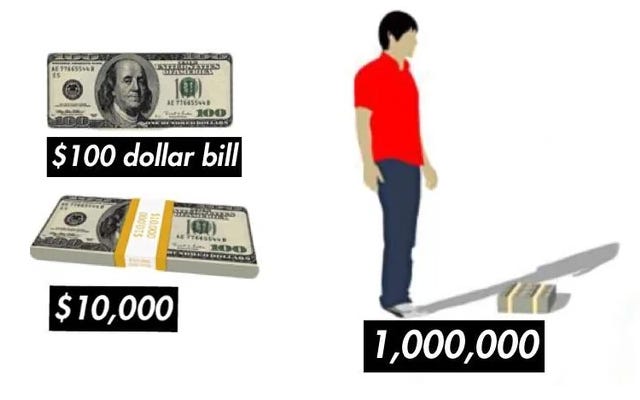Is trust a 'talent' or a learned skill?
The King inherently trusts you because he knows you and expects much of you, but nothing more than you are able to. My paraphrase of 1 Corinthians 10:13
The Parable of the Talents in the Gospel of Matthew, chapter 25 verses 14-30 has haunted me since my toddler years.
I’ve never been able to put my finger on it, but I just know there is more to it than I could comprehend. Each time I read it, I was filled with fear, because when evaluating my own life…
Am I being lazy?
Am I being worthless?
The word for 'talent' in both English and Afrikaans (my mother tongue) is very similar. Identical really with the exact same spelling and meaning. However, this parable from Matthew in the 1983 Afrikaans translation of the Bible spoke about 'gold coins'.
I understood it more figuratively, as a person's natural aptitude or inherent skill from the English translation since I was in an English school from 1991 to 1997.
Confusing ‘talent’ from English, with ‘talent‘ in Afrikaans when it is really ‘talent’ in Greek…and that’s the way I always understood and remember the parable, as "talents"…not money!
Although I wrestled with the text as it seems to clearly indicate our talents can be taken away if we don't use it. Which is strange, but God is called אֵל שַׁדַּי, in Hebrew. Translated as El Shaddai, which means God most powerful or God Almighty. Deus Omnipotens in Latin. So, I reckon he could do that if He wanted to. The meaning was lost in my own school-mother-tongue transition and misunderstanding growing up.
Revisiting the subject again after many years, skills may be one way of interpreting a deeper meaning into the parable, but the word, talanton1, was also a measurement used for currency in ancient times.
So, how much would a talent be worth? Some sources say 20 years of wages. Which is a lot of money, sure, but let's get a more concrete value for discussion purposes.
Aah, this source says it's 3000 shekels2.
Dagnabbit! Further down the rabbit hole we go…
What is a shekel?3
The origin of the name "shekel" (שֶׁקֶל) is from the ancient Biblical currency by the same name. An early Biblical reference is Abraham being reported to pay "four hundred shekels of silver" to Ephron the Hittite for the Cave of the Patriarchs in Hebron (Genesis 23:15–16).
Shekel is any of several ancient units of weight or of currency in ancient Israel, from the Hebrew root ש-ק-ל (š-q-l) meaning 'weigh' (שָׁקַל šaqal 'to weigh', שֶׁקֶל šeqel 'a standard weight'), common with other Semitic languages like Akkadian (resp. šaqālu and šiqlu) and Aramaic (resp. תְּקַל teqal and תִּקְלָא tiqla). Initially, it may have referred to a weight of barley. In ancient Israel, the shekel was known to be about 180 grains (11 grams or 0.35 troy ounces).
Let's do some stuff for 'eggheads' as Donald Duck put it in his journey through Mathmagic Land. (If you have the time, I implore you to watch this jewel from yesteryear…)
If there is anything that can be learned from that wacky duck, he tried and was never afraid of failing. He jumped into mathematics as part of an adventure of discovery.
Unafraid.
A virtue that more people can strive towards in our fear mongering societies that do not ever want to rock the boat or challenge the status quo.
Alright, time for some calculations or more specifically a conversion exercise:
1 talent = 3000 shekels
1 shekel = 0.35 troy ounces = 0.384 ounces
So, the weight of 1 talent will be:
3000 shekels x 0.384 oz = 1152oz
Gold price / ounce = $2314.07 (price on 9 May 2024)
Thus,
1152oz x $2319.10/oz = $2,665,808.64
Therefor:
1 talent = $2.67 million
That's pretty close to what the experts calculated!4
Let's stick to this value, as the point is, it’s a lot of money.
A side note, David prepped many resources for Solomon to build the temple. Among the resources were 100,000 talents of gold and 1,000,000 talents of silver as per 1 Chronicles 22:14.
Now, imagine someone gives you $2.67 million, i.e. the one talent scenario. Then the guy disappears. Doesn't tell you when he'll be back and you are so scared to do or risk anything, you bury the money for safekeeping. You don't even consider investing it because you know the guy.
Let's turn the players around somewhat. YOU give a financial manager that amount of money. You go on a trip, come back and discover this professional was so afraid of you, he didn't even follow his mandate as a financial manager.
As Jesus puts it in the parable, verses 23 and 24 (my paraphrase)
"I know you. You are a stern man! Thus, I hid your money and here it is given back to you."
This scenario is a professional relationship, and it conjures so much anger in us, because the professional did not do the job he was appointed to do.
Why?
In a word, the issue is stewardship.
According to Arthur Burk, CEO of the Sapphire Leadership Group, the definition of stewardship is doing somebody else's work with somebody else's resources5.
I believe this is why we are enraged. This individual was given stewardship of those resources and he neglected to use them in an appropriate manner. I believe that’s also why Jesus ends the parable on such a harsh note.
Let’s try and get to the deeper meaning of the parable by considering God. He wants to have a personal relationship with you as a believer. The issue then becomes one of being entrusted and trust. If you are so afraid of Him that you are not even willing to risk taking a chance with what you have been entrusted with, do you really trust him?
Despite the fact that He made you and equipped you with everything you need for this life, as the Apostle Paul outlines it in his letters:
2 Peter 1:3 (LEB)
"...because his divine power has bestowed on us all things that are necessary for life and godliness, through the knowledge of the one who called us by his own glory and excellence of character..."
Ephesians 2:10 (LEB)
"For we are his creation, created in Christ Jesus for good works, which God prepared beforehand, so that we may walk in them."
The Greek word Paul uses, “peripateo”, can be translated as to tread all around or walk at large as proof of ability. Said differently, to demonstrate competence.
Where do you walk most easily? A path.
Don’t we talk about our ‘path in life’?
As believers, we are called to do God's work with Heaven's resources.
The previous passages hinted at God having already given us what we'll need. But Jesus gives us even further assurance to help allay our fears and live boldly:
Matthew 7:11 (LEB)
Therefore if you, although you are evil, know how to give good gifts to your children, how much more will your Father who is in heaven give good things to those who ask him?
What is clear from this passage, we need to ask and trust.
Don't let fear stop you. Let your faith grow on a daily basis by walking (demonstrating) with Him in the path He has set out for you as spoken through the Prophet Jeremiah:
Jeremiah 6:16 (LEB)
Stand at the roads and look,
and ask for the ancient paths6, where the way of the good is,
and walk in it, and find rest for your inner selves.
As customary, the Hebrew word translated as ‘ancient paths’, can have multiple meanings. Indeed, it does mean a road, but it can also refer to a course of life or mode of action.
Thus, we are called to stand and consider our course of life.
Even if you fail, you gained knowledge and experience through risking trust and you will grow from that endeavor as well.
Baby steps…
We don't declare a child unable to walk after their first attempt of standing up, falling down and seeing that they continue to crawl. We believe the ability to walk is there.
In other words, we trust that they can do it!
They already have the necessary resources. They just need time to develop the skill, and we encourage them to try again and again until eventually the ability is cultivated.
When was the last time you allowed yourself to fail? Or let's take it from a different angle, when was the last time you tried something new and had the mindset at the outset, “It's ok if I can't do it. I'm learning…”?
I'd recommend doing a stock take today like Jeremiah says. Stand and consider your way. What has been given to you to expand the Kingdom? Whether it is about money or talents or whatever else in life, the fact of the matter is that which has been given you, should not be hidden away. But ask for the ancient ways or rather an ancient way of life and then, trust. Or should I rather say risk to trust.
Find solace in the knowledge that the 'game' is rigged in your favor. The 'house' is on your side…
God even gives us a clue on how to go about accomplishing our walk. In short, increase your understanding. Don't settle for what you know. Trust.
Proverbs 3:5-6 (LEB)
5 Trust Yahweh with all your heart;
do not lean toward your own understanding.
6 In all your ways acknowledge him,
and he will straighten your paths.
Exercise trust as a skill. One as crucial as walking. On a constant daily basis, ask and risk with God. Acknowledge Him.
Finaly, consider the 10 talent scenario…it’s a lot of money. 200 years’ worth of wages.
Do you have the integrity of character for God to entrust you with $26.7 million and can you be expected to expand His Kingdom?
Stewardship.
In my case? I have to write.
Time to further tread the path and demonstrate that which has been given me.
Until next time dear Reader.
Sláinte mhath7.
EL. τάλαντον : talanton - 'scale' and 'balance' was a unit of weight of approximately 80 pounds (36 kg). As a unit of currency, a talent was worth about 6,000 denarii. 1 denarius being the pay for a single day’s labor
What Is a Talent Weight? Bible Units and Measurements (learnreligions.com)
Israeli Shekel - https://en.wikipedia.org/wiki/Israeli_new_shekel
Kurt Heckman - One Talent of Gold - https://www.vcalc.com/wiki/KurtHeckman/One+Talent+of+Gold+Today
Sapphire Leadership Group, LLC (theslg.com)
IW: דְּרָכִ֨ים : derakim - plural of ‘derek’ - A road, a course of life, mode of action
Gaelic for “good health”. A toast usually shortened by Scottish whisky patrons to simply be ‘sláinte‘ meaning health - used here as a blessing for you.








